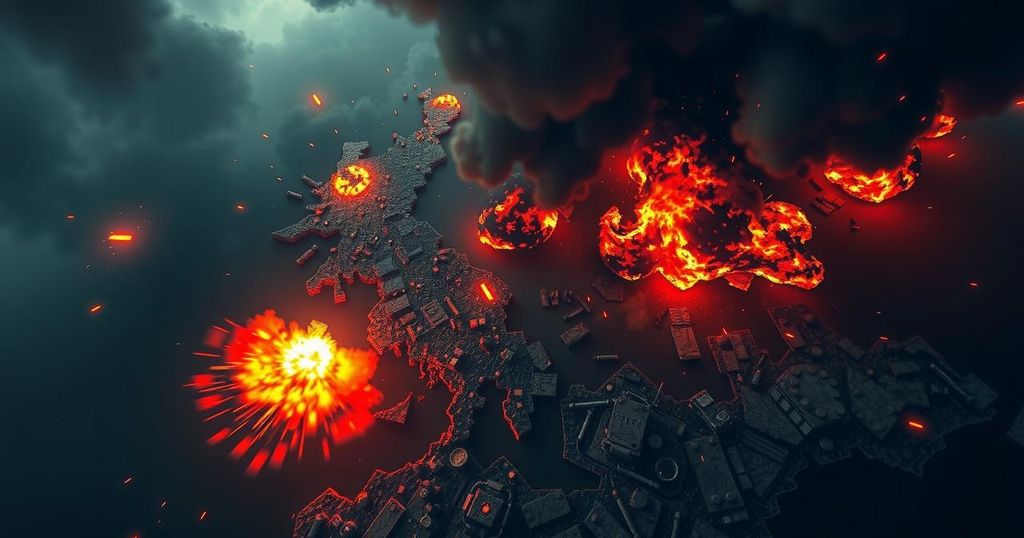Recent rocket attacks from Lebanon have resulted in seven fatalities, including four foreign workers, marking a significant escalation in the conflict between Israel and Iran-backed groups. Concurrently, Israeli military operations continue in Syria, targeting Hezbollah’s weapon supplies. U.S. diplomats are active in the region seeking cease-fires, yet significant mistrust persists among the parties involved, hampering progress towards peace.
In the ongoing hostilities between Israel and Iran-backed factions, a recent rocket barrage from Lebanon has tragically claimed the lives of at least seven individuals in northern Israel, marking the most lethal incident since the conflict escalated earlier this month. Among the deceased were four foreign workers, a reflection of the broader human cost of the conflict. The attacks, targeting two locations, coincided with high-level diplomatic efforts by U.S. officials aiming to secure cease-fires in both Lebanon and Gaza, amidst rising tensions in the region. Since the onset of Hamas’s assault on October 7, 2023, Israel has faced a near-constant onslaught of rockets, drones, and missiles from Hezbollah, which has prompted reciprocal military responses. Both Hezbollah and Hamas, viewed as Iranian proxies, have attracted international condemnation and labels as terrorist entities by numerous governments, including that of the United States and Israel. On the same day as the rocket attacks, the Israel Defense Forces (IDF) conducted airstrikes in Syria, specifically targeting locations near Qusair, a strategic area for Hezbollah’s weapons storage and smuggling operations. These military actions signal Israel’s ongoing commitment to disrupt supply chains utilized by Hezbollah, which poses a perennial threat at its northern borders. The recent surge in violence has roots in Israel’s offensive beginning last month, which resulted in significant casualties among Hezbollah’s leadership and heightened military engagement along the border. Reports from Lebanese authorities indicate approximately 2,000 fatalities due to Israeli airstrikes within their territory, contributing to an alarming humanitarian crisis with over 1.2 million individuals forcibly displaced. In Israel, rockets have taken a considerable toll, with the death toll reaching at least 68, including a notable contingent of military personnel. The alarming frequency of attacks has necessitated evacuations and fortified defenses in settlements adjacent to the Lebanese frontier, affecting over 60,000 residents. Despite ongoing discussions led by U.S. officials regarding potential cease-fires and hostage negotiations, tangible progress remains elusive. Diplomatic propositions suggest a temporary cessation of hostilities, yet skepticism persists regarding the effectiveness of any ensuing agreements, particularly given the deep-seated mistrust between the parties involved. For instance, the proposal for a two-month cease-fire is met with reluctance from Israel, which doubts the reliability of U.N. peacekeeping forces due to historical failures in mitigating Hezbollah’s entrenchment near the border.
The complex geopolitical landscape of the Middle East has been marred by longstanding conflicts involving Israel, Iran, and various militant factions. Israeli tensions with Hezbollah and Hamas have been exacerbated by a series of violent escalations, primarily rooted in ideological alignments and territorial disputes. The ongoing skirmishes illustrate the fraught nature of Lebanon-Israel relations, wherein Iranian influence through proxy groups has resulted in numerous confrontations, sparking international concerns over broader regional stability. The situation has generated humanitarian crises, with substantial casualties and displacements affecting civilians on both sides, necessitating urgent diplomatic interventions to mitigate further violence and restore order.
The recent escalations in violence between Israel and Iranian-backed groups, notably through rocket fire from Lebanon resulting in tragic casualties, underscore the urgent need for diplomatic intervention to forge a path toward lasting peace. Amidst ongoing military operations and high-level discussions aimed at establishing cease-fire agreements, the parties exhibit significant mistrust, complicating the prospects for resolution. The humanitarian toll continues to rise, necessitating immediate action from international mediators and regional stakeholders to avert further loss of life and stabilize the precarious situation.
Original Source: www.cbsnews.com







